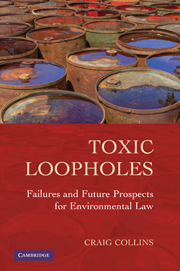Book contents
- Frontmatter
- Contents
- Dedication
- Introduction: Crime Without Punishment
- 1 The EPA – Policing or Protecting Polluters?
- 2 The Clean Air Act – Gasping for Breath
- 3 The Clean Water Act – Up Sh*t Creek
- 4 Superfund and RCRA – Toxic Trash
- 5 TSCA – The Toothless Tiger
- 6 The Endangered Species Act – Noah's Ark or Titanic?
- 7 Planetary Problems – Cooperation or Collapse?
- Conclusion: A Glimmer of Hope
- Bibliography
- Index
5 - TSCA – The Toothless Tiger
Published online by Cambridge University Press: 05 June 2012
- Frontmatter
- Contents
- Dedication
- Introduction: Crime Without Punishment
- 1 The EPA – Policing or Protecting Polluters?
- 2 The Clean Air Act – Gasping for Breath
- 3 The Clean Water Act – Up Sh*t Creek
- 4 Superfund and RCRA – Toxic Trash
- 5 TSCA – The Toothless Tiger
- 6 The Endangered Species Act – Noah's Ark or Titanic?
- 7 Planetary Problems – Cooperation or Collapse?
- Conclusion: A Glimmer of Hope
- Bibliography
- Index
Summary
The Toxic Substances Control Act (TSCA) bestows sweeping authority upon government officials. It empowers the EPA to completely ban or sharply restrict any potentially dangerous chemical. With such massive regulatory clout over chemical production, one would hardly expect TSCA to be popular with Monsanto, GE, Dow or DuPont – but it is. In fact, a phalanx of industry cheerleaders and bodyguards zealously defend TSCA from all critics and would-be reformers. The managing director of the American Chemistry Council raves, “TSCA not only protects health and the environment, it also fuels innovation.”
Industry's bewildering enthusiasm for TSCA is further confounded by its universal disrepute among environmentalists. No one in the Sierra Club, Friends of the Earth, Environmental Defense or Greenpeace has a good word to say about it. Ken Cook, of the Environmental Working Group, dismisses TSCA as a “largely toothless statute.” But how could anyone call a law toothless that thoroughly screens chemicals and keeps dangerous ones off the market? If this law is powerful enough to prevent further contamination of our country, eliminate toxins from our food, remove hazardous substances from the products we consume and reduce the tonnage of toxic waste, why aren't environmentalists singing its praises?
But maybe industry likes TSCA precisely because it isn't really the regulatory powerhouse it appears to be.
- Type
- Chapter
- Information
- Toxic LoopholesFailures and Future Prospects for Environmental Law, pp. 113 - 124Publisher: Cambridge University PressPrint publication year: 2010
- 1
- Cited by



